Interview with Former Dean Donald Polden of Santa Clara Law School
Published October 2006, last updated July 2009
Top-Law-Schools.com is honored to have an exclusive interview with Donald J. Polden, the newly appointed Dean of Santa Clara Law School (View Profile). Dean Polden had been Dean at the University of Memphis Law School for ten- years previous to accepting his position at Santa Clara Law School. Dean Polden’s tenure at the University of Memphis was marked by great improvements in the law school and his extensive student involvement, traits he plans on bringing to Santa Clara Law School.
Dean Polden is a very congenial and kind man whose commitment to Santa Clara Law School and its students was evident throughout the interview.
Dean Polden, thank you for granting this interview. Can you please discuss what major goals you plan to accomplish at Santa Clara Law School over the next few years?
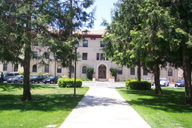 While I am quite new at being Dean at Santa Clara’s law school, I have considerable experience at law school administration and leadership. My main goal is to continue to build upon the great progress that has already been underway for several years under Dean Player’s leadership. Additionally, I do have five priorities over the next few years that I am planning on implementing.
While I am quite new at being Dean at Santa Clara’s law school, I have considerable experience at law school administration and leadership. My main goal is to continue to build upon the great progress that has already been underway for several years under Dean Player’s leadership. Additionally, I do have five priorities over the next few years that I am planning on implementing.
First, I would like to strengthen the faculty’s commitment to mentoring and teaching our students. While already extensive, I want to ensure that open communication and connection between students and faculty is manifest at all levels.
My second goal over the next five years is to address the space constraints the law school is presently experiencing. While most law school activities are held in two buildings, the law school’s operations extend to many buildings across the campus. Adding space, and thereby being able to bring all our facilities together, will help integrate our legal programs and permit our faculty and staff to work more efficiently.
Third, I will continue to expand and strengthen curriculum choices in all areas, but particularly in our three areas of concentration, high technology law, international law, and public interest law. These programs already have achieved, or on the verge of attracting, national prominence and attention, and this extra push will ensure their continued excellence. These improvements will not be implemented just to have Santa Clara Law School listed on the law school rankings, but instead to attract the best students and faculty to our programs. For example, several years ago, the law school attracted Professor Don Chism, who is perhaps the leading scholar and thinker in patent law, to the faculty. This past summer, we attracted Professor Tyler Ochoa, an emerging national star in the area of copyright law, to the faculty. Santa Clara Law must continue to strengthen its curriculum and its faculty in the areas of emphasis that have been built in recent years.
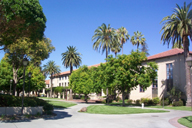 The fourth area I plan to focus on is hiring outstanding scholars with national and international reputations. These professors will have first-rate national profiles due to their extensive scholarship and publications. As I mentioned above, the law school has been moving in recent years to strengthen its faculty and adding top scholars and thinkers is an essential method of building academic and professional strength to the law school.
The fourth area I plan to focus on is hiring outstanding scholars with national and international reputations. These professors will have first-rate national profiles due to their extensive scholarship and publications. As I mentioned above, the law school has been moving in recent years to strengthen its faculty and adding top scholars and thinkers is an essential method of building academic and professional strength to the law school.
There is an excellent opportunity to recruit these new scholars as approximately one-fourth of our distinguished faculty is retiring or reducing their teaching loads over the next few years. Santa Clara’s terrific location and increased prominence makes it very easy to attract great faculty to this law school. Having spent many years in Iowa, I can personally tell you how amazing this weather is and what a difference it makes.
The fifth and final area of focus will be the financial strength of the law school. A top priority will be to continually build up the law school’s endowment which will strengthen our institutional finances and allow long-term planning for growth. While there are already several renowned programs, particularly the three certificate programs in high technology, international, and public interest law, I want increased funding leading to increased visibility of Santa Clara Law School.
What we do now affects the future. As more law schools face financial hardships, there may be shake out amongst law schools. The goal is not to be one of the law schools shaken out. So, how will we accomplish the financial strengthening of the law school?
I will focus upon alumni, foundations and local law firms to invest in the law school’s future through extensive fundraising and promoting the value of the law school’s programs.
The law school really grew in the 1970s, mirroring the population growth of Silicon Valley. Now, many of our alumni are “legal heavyweights” all over the nation and name partners in large law firms. As these alumni reflect upon the benefit Santa Clara Law School gave to their careers, they are likely to give back to the law school. Particularly as these alumni think of retirement and worthy causes to donate to, Santa Clara Law School should come to mind.
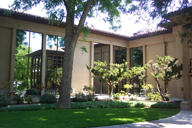 The great work we are doing here should also inspire donations. The Santa Clara Community Law Center provides legal help to those in the community who otherwise would not be served, consistent with the law school’s focus upon community service and pro bono work. Our centers of distinction (in high tech/intellectual property, social justice and public service, and international and comparative law) and our clinical outreach programs provide excellent opportunities for foundation support.
The great work we are doing here should also inspire donations. The Santa Clara Community Law Center provides legal help to those in the community who otherwise would not be served, consistent with the law school’s focus upon community service and pro bono work. Our centers of distinction (in high tech/intellectual property, social justice and public service, and international and comparative law) and our clinical outreach programs provide excellent opportunities for foundation support.
The law school was recently determined to have the best public interest program by the National Pro Bono Student Association. For example, over 75% of our professors are actively involved in pro bono counseling. Public interest law is what Santa Clara Law School was known for before high technology law. Community volunteer work still resonates with our faculty and students of today.
Our extensive involvement with the local community will help us in our fundraising drive with local law firms and technology companies.
Working on these five priorities should keep me pretty busy for the next few years. Additionally, I hope to teach a little, for I enjoy this interaction with the students.
Dean Polden, while heading the University of Memphis Law School you were very involved with the students and made special efforts to introduce yourself to them, such as having a breakfast orientation with all incoming students. Please discuss any plans you have to carry on this tradition at Santa Clara Law School?
Dean Donald J. Polden: Ken, the idea here is to find ways to communicate effectively and often with our students. I start with the premise that law students are smart, thoughtful about their education, and quickly form an interest in the success of their law school. They are very interested in how the law school leadership (faculty and staff) is planning for the law school’s future and what kind of job the administration is doing on running the law school. So, I plan to find the most effective ways of communicating this information—and that means, in particular, listening to their ideas and concerns—to them. We have an excellent law student newspaper, a list-serve containing all our students’ email addresses, and an outstanding website. These provide wonderful mediums for communication with students, as is the “open door” policy I maintain for our students and faculty.
Please explain what impact the Catholic, Jesuit heritage of Santa Clara University has upon the law school and its students?
Dean Donald J. Polden: The hallmark of the Jesuit order is their commitment to education, and in this instance professional education. As a result of our Jesuit founding, Santa Clara Law School is focused upon the exploration of morals and ethics and the school examines questions such as how legal education should be influenced by ethics and morals. The Jesuit tradition tries to build moral and ethical people in their everyday lives, and that is an important message irrespective of one’s theology or religious background.
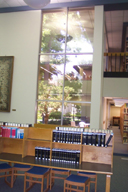 We obviously live in a world today where lawyers are faced with possibly making immoral choices and actions. Examples abound, such as the recent MCI and Enron scandals and the Watergate scandal in the past, where lawyers were either facilitating wrongdoing by others or were themselves engaged in improper and illegal conduct. We use our traditions of encouraging public service and the constructing proper professional values and ethics to help our students avoid these situations when they leave the law school and serve their clients. Santa Clara’s ethical training is integrated throughout our law school curriculum to help students make proper decisions.
We obviously live in a world today where lawyers are faced with possibly making immoral choices and actions. Examples abound, such as the recent MCI and Enron scandals and the Watergate scandal in the past, where lawyers were either facilitating wrongdoing by others or were themselves engaged in improper and illegal conduct. We use our traditions of encouraging public service and the constructing proper professional values and ethics to help our students avoid these situations when they leave the law school and serve their clients. Santa Clara’s ethical training is integrated throughout our law school curriculum to help students make proper decisions.
Additionally, the University’s Jesuit heritage is evident in Santa Clara Law School’s commitment to public interest law and community service, such as our Community Legal Center (the East San Jose Community Law Center) and the Northern California Innocence Project.
I should note, however, that while the law school draws on the traditions and moral strengths of the Jesuit Order, religion as such does not play an active part in the day to day life of the law school. For example, religion is not a factor in admissions decisions or faculty or staff hiring. There are no litmus tests connected to religion or religious beliefs. This too is characteristic of the Jesuit order, which focuses upon education and encourages its colleges to seek the best students and faculty possible.
Assistant Dean Julia Yaffee: The Jesuit commitment to professional education is evidenced by the fact that one out of every ten law students attends a Jesuit law school. Examples of other Jesuit law schools include the University of San Francisco, Gonzaga, Marquette, and all 3 Loyolas, located in Chicago, New Orleans, and Los Angeles. They are a chain (laughter).
Santa Clara Law School was founded in 1912, the same time period as most of the other Jesuit law schools, as a part-time program for the working class. The goal of the Jesuit law schools was to provide an opportunity for those who were not of a privileged class to transition to the legal field. The Jesuits felt that providing legal education and resulting legal services to the underrepresented in society would help spur social equality and justice.
What do students enjoy most about Santa Clara Law School?
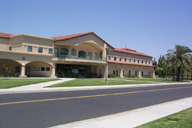 Assistant Dean Julia Yaffee: We have done surveys of why students choose Santa Clara Law School, and the most common response was the great atmosphere found at the law school. There is a real sense of community and camaraderie amongst the students and the faculty.
Assistant Dean Julia Yaffee: We have done surveys of why students choose Santa Clara Law School, and the most common response was the great atmosphere found at the law school. There is a real sense of community and camaraderie amongst the students and the faculty.
Well over 40% of students come from state schools, and these students really enjoy the personal attention and small, collegial environment that we provide as a private school. They wanted the opportunity to attend law school on a beautiful campus, and not just on a building block in downtown near a jail where many urban law schools are located. Many California law schools, such as Loyola Marymount and McGeorge, are not on campus and these isolated law schools do not give students the feeling of attending graduate school.
While most law students live off campus, I think the amount of time the law students spend on campus is directly correlated to the quality of the campus. I think our students have the opportunity to get to know each other better, to develop a sense of camaraderie and rapport that breaks down the animosity that leads to tearing pages out of books which everyone needs for an exam. That just does not happen here, for students have a sense of knowing each other.
Additionally, the administration and faculty really tries to make create a positive environment that fosters learning and friendship. An example of the bond the faculty forms with their students, several faculty members will have their small section students over to their house for dinner.
Santa Clara Law School seeks to create an environment that fosters learning and the exchange of ideas between the faculty and students.
Please discuss any differences or interplay between the part-time evening program and the full-time day program.
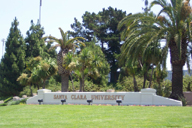 Assistant Dean Julia Yaffee: The admission standards of the night program are approximately as high as the daytime program. The only real distinctions between the two sets of students are the increased age and work experience of the part-time students, who generally have been in the workforce for several years.
Assistant Dean Julia Yaffee: The admission standards of the night program are approximately as high as the daytime program. The only real distinctions between the two sets of students are the increased age and work experience of the part-time students, who generally have been in the workforce for several years.
The part-time program gives working individuals, such as engineers and software developers, an opportunity to go to law school and strengthen their career opportunities by combining their technical backgrounds with a legal education. Full-time students, who often take some of the many classes offered at night and the weekends, benefit from interacting with the part-time students who can offer a different perspective due to greater life and job experiences.
What do you think are the most important considerations admitted applicants should examine when choosing which law school to attend?
Dean Donald Polden: I believe that the principal factors are: cost or affordability, location, the culture or ethos of the school and particular areas of curricular innovation. I’ll say a few things about each. The cost of legal education, like many other assets, is increasing and law student debt load (i.e., the accumulated loan commitments of graduating law students) is increasing significantly. Prospective law students must be very thoughtful in planning for their careers and viewing realistically their ability to repay their student loans. However, it is not analytically sound to focus only on the probable debt incurred for three years of law school. It is necessary to analyze the likelihood of working during law school (during the summers or part-time during the academic year, or both) and, more significantly, the salaries earned by graduates in recent years. Those factors (along with the loan availability, interest rates, and repayment schedules) must be taken into account when considering the cost and affordability of a legal education.
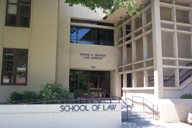 Most law school graduates will practice in the area (principally, the state) where they went to law school. This is not a universal rule and many law students will go to law school “out of state” with the intention of returning home after law school. Some do, but many will develop networks of friends and professional acquaintances in the state or location of their law school and will remain there. So, prospective law students should factor the location of the law school into their decision-making matrix. For example, the Silicon Valley, where Santa Clara Law School is located, has provided a tremendous set of employment opportunities for law school graduates and this has attracted many law students to schools like Stanford and Santa Clara.
Most law school graduates will practice in the area (principally, the state) where they went to law school. This is not a universal rule and many law students will go to law school “out of state” with the intention of returning home after law school. Some do, but many will develop networks of friends and professional acquaintances in the state or location of their law school and will remain there. So, prospective law students should factor the location of the law school into their decision-making matrix. For example, the Silicon Valley, where Santa Clara Law School is located, has provided a tremendous set of employment opportunities for law school graduates and this has attracted many law students to schools like Stanford and Santa Clara.
Third, each law school has a unique ethos or culture, as I mentioned above. Some law schools are very committed to supporting its students' academic and professional growth through student organizations and staff and faculty support. Other law schools, while obviously interested in their students’ success, are more impersonal and student life is less focused around the law school. Prospective law students should find the kind of campus life that suits their needs and interests.
Finally, we are finding many prospective law students who are a pretty good idea of a practice area they are interested in pursuing during and after law school. For example, Santa Clara Law attracts many highly educated engineers, “hard science” majors and technology industry people to its High Tech/Intellectual Property program. They are interested in developing their expertise in patent and copyright law, using their science and engineering backgrounds. So, for them, a law school like Santa Clara is ideal because of its sophisticated and extensive curriculum in those areas and its location. However, I want to point out that most prospective law students do not have a particular practice area in mind when they come to law school and, indeed, many law students graduate without an area of specialization or emphasis. These law students selected courses that were “core” or bar examination courses, were taught by professors they admired, or were interesting courses. So, prospective law students who are interested in particular practice or specialization areas should look for those among American law schools and those who are interested in obtaining a broad, general legal education should make sure that the schools they are interested in have a strong, broad curriculum available to their students.
What should college students be doing now to prepare for success in law school?
 Dean Donald Polden: I encourage prospective law students to read about law schools (or visit their websites) and, more importantly, visit the law school before enrolling. There are many excellent law schools in the United States and each is unique in its strengths, weaknesses, faculty and student body. You won’t pick up those differences from reading rating reports or surveys. Set up an appointment with the admissions professionals, visit a class, spend some time with the students who are attending the law schools you are interested in.
Dean Donald Polden: I encourage prospective law students to read about law schools (or visit their websites) and, more importantly, visit the law school before enrolling. There are many excellent law schools in the United States and each is unique in its strengths, weaknesses, faculty and student body. You won’t pick up those differences from reading rating reports or surveys. Set up an appointment with the admissions professionals, visit a class, spend some time with the students who are attending the law schools you are interested in.
Do you have any final advice to convey to the readers of www.top-law-schools.com?
Dean Donald J. Polden: Ken, thank you for this opportunity to communicate with prospective Santa Clara law students. I encourage them to learn more about Santa Clara’s outstanding legal education program and to contact us (the contact information is on the introductory page of the top-law-schools website) if they would like additional information. More over, I encourage them to check out the law school’s website—it is terrific!
Interview with Edward Tom, Former Dean of Admissions U.C. Berkeley Boalt Hall School
Interview with Richard Geiger, Former Associate Dean and Dean of Admissions for Cornell Law School
Interview with Former Dean David E. Van Zandt of Northwestern University School of Law
Interview with Former Dean Robert Berring of Boalt Hall
Interview with Former Dean Sarah Zearfoss University of Michigan Law School
Interview with Professor Brian Leiter
Interview with Former Dean Victoria Ortiz UC Irvine School of Law
Interview with Former Dean Donald Polden of Santa Clara
Interview with Former Dean Jeanette Leach of Admissions to Santa Clara University's School of Law
Interview with Santa Clara Law School Former Assistant Dean Alexandra Horne
Interview with Former Dean Hasl of Thomas Jefferson School of Law
Interview with Joan Howland, Former Associate Dean at the University of Minnesota
Interview with Former Dean Evan Caminker of University of Michigan Law School
Interview with Former Dean Erwin Chemerinsky UC Irvine School of Law
Interview with Former Dean Jason Trujillo of UVA Law
Interview with Former Dean Stewart Schwab of Cornell Law School
Interview with Ann Perry of The University of Chicago Law School
Interview with Johann Lee at Northwestern University Law School
Interview with Kevin Johnson UC Davis Law
Interview with Former Dean Robert Rasmussen of USC Law
Interview with Dr. Karen Reagan Britton, UT Law
Interview with Dean Doug Blaze, UT Law
Interview with Jannell Roberts, Former Associate Dean of Admissions at Loyola Law
Interview with Susan L. Krinsky, Former Associate Dean of Admissions at Tulane Law
Interview with Faye Shealy, Former Associate Dean of Admissions at William & Mary Law School
Interview with Robert H. Jerry, II, Former Dean & Levin Mabie and Levin Professor of Law
Interview with Former Dean Earl Martin of Gonzaga Law
Interview with Stephen Brown, Associate Dean of Admissions at the Fordham University School of Law
Interview with Jacqlene Nance, Former Director of Admissions at the University of Kansas School of Law
Interview with Former Dean Robert Schwartz at UCLA School of Law
Interview with Matthew Diller, Former Dean and Professor of Law at Benjamin N. Cardozo School of Law
Interview with Andy Cornblatt, Dean of Admissions at Georgetown University Law Center (GULC)
Interview with Chris Guthrie, Dean of the Vanderbilt University Law School
Interview with G. Todd Morton, Assistant Dean and Dean of Admissions for Vanderbilt University Law School
Interview with Susan Lee, Former Director of Admissions at Gonzaga University School of Law
Interview with Arizona State University Sandra Day O’Connor College of Law Former Dean and Foundation Professor of Law – Paul Schiff Berman
Interview with Alissa Leonard, Director of Admissions and Financial Aid at the Boston University School of Law
Interview with David Partlett, Former Dean of Emory University School of Law
Interview with Michelle Rahman, Former Associate Dean for Admissions at the University of Richmond School of Law
Interview with Isabel DiSciullo, Former Assistant Dean of Admissions for Drexel Law
Published July 2010 Introduction Top-Law-Schools.com would like to thank Asha Rangappa, Associate Dean for Admissions at Yale Law School, for taking the time to answer our questions! TLS: Since becoming Associate Dean in 2007, you have reached out to th
Interview with Josh Rubenstein, Former Assistant Dean for Admissions at Harvard Law School
Interview with Renee C. Post at the University of Pennsylvania School of Law
Interview with Former Dean Rita C. Jones of Boston College Law School
Interview with S. Brett Twitty, Former Director of Admissions, W&L Law
Interview with Lillie V. Wiley-Upshaw, Vice Dean for Admissions and Financial Aid, University at Buffalo Law School
Interview with Nikki Laubenstein, Director of Admissions at Syracuse University College of Law
Interview with Janet Laybold, Former Associate Dean, Admissions, Career and Student Services, Washington University School of Law
Interview with Anthony Crowell, Former Dean of New York Law School
Interview with Jessica Berg and Michael Scharf, Former Co-Deans of Case Western Reserve University School of Law
Interview with Alyson Suter Alber, Associate Dean for Enrollment Planning and Strategic Initiatives, Case Western Reserve University School of Law
Interview with Jeffrey A. Dodge, Former Associate Dean of Students, Academic Affairs & Administration, University of Idaho College of Law
Interview with L. Pilar Mensah, Assistant Dean for Admissions; Sondra R. Tennessee, Associate Dean for Student Affairs; and Tiffany J. Tucker, Assistant Dean for Career Development, University of Houston Law Center
Interview with Jay L. Austin, Former Assistant Dean, Admissions and Student Financial Services, UC Irvine School of Law
Interview with Mathiew Le, Former Assistant Dean of Admissions & Financial Aid, University of Washington School of Law
Interview with Daniel M. Filler, Dean and Professor of Law, Drexel University, Thomas R. Kline School of Law
Interview with Donald Tobin, Dean and Professor of Law, the University of Maryland Francis King Carey School of Law
Interview with Amy Mangione, Assistant Dean and Director of Admissions, Albany Law School
Interview with Christopher J. Peters, Former Dean and Professor of Law, The University of Akron School of Law
Interview with Carla Pratt, Dean and Professor of Law, Washburn University School of Law
Interview with Michelle Rahman, Associate Dean for Admissions, the University of Richmond School of Law
Interview with Verna Williams, Interim Dean and Nippert Professor of Law, the University of Cincinnati College of Law
Interview with Allen Rostron, Former Associate Dean for Students and the William R. Jacques Constitutional Law Scholar and Professor of Law, University of Missouri-Kansas City School of Law
Interview with Faye Shealy, Former Associate Dean for Admission, William & Mary Law School
